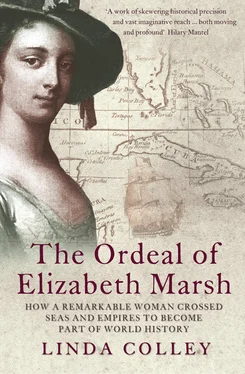1 ...8 9 10 12 13 14 ...22 Like most mariners in the age of sail, Milbourne Marsh had gone to sea very early. He recalled in middle age how, when just eleven years old and already sailing the Mediterranean, he was regularly handling explosives. He would be sent on shore from whatever vessel he was on at the time, and ordered to blow up rocks into small stones so as to provide ballast for the ship’s hold. 57 Yet to view him simply as a manual labourer would be quite wrong. Thomas Rowlandson’s sensitive study of a ship’s carpenter was made more than a decade after Milbourne’s death, but the tools the artist gives his figure – an adze in one hand and a drawing instrument in the other – accurately convey the occupation’s composite quality. As suggested by the adze (an axe with a curved blade), it involved hard physical effort. Timber had to be cut to size, a ship’s rotten wood and any cannon shot embedded in it cut out and made good. As indicated by the drawing instrument, however, this was only part of the job. Milbourne was fully literate, and he had to be. A ship’s carpenter was expected to write ‘an exact and particular account’ of his vessel’s condition and propose solutions to any defects. He needed to know basic accounting so as to estimate the cost of repairs, and keep check of his stocks of timber and other stores. And he required mathematical and geometrical skills: enough to draw plans, calculate the height of a mast from the deck, and estimate the weight of anchors and what thickness of timber was required to support them. 58
Looked at this way, it becomes easier to understand why the foremost English shipwright of the late seventeenth century, Anthony Deane (c.1638–1720), was knighted and made a Fellow of the Royal Society. Because of increased transoceanic trade, expanding empire, the growth of European and of some non-European fighting navies, and recurrent warfare, skills of the sort that Milbourne Marsh commanded were in urgent national and international demand. Not for nothing do we refer today to ‘navigating’ and ‘surfing’ the web. Rather like cyberspace now, the sea in Milbourne Marsh’s time was the vital gateway to a more interconnected world. Consequently, those in possession of the more specialist maritime skills were in a position to rise economically, and often socially as well. ‘The Ship-Carpenter … to become master of his business must learn the theory as well as practice,’ Britain’s most widely read trade directory insisted in 1747: ‘it is a business that one seldom wants bread in, either at home or abroad.’ 59
The nature of her father’s occupation was of central importance in Elizabeth Marsh’s life. At one level, and along with her many other seafaring relations, Milbourne Marsh gave her access to one of the few eighteenth-century organizations genuinely possessed of something approaching global reach: the Royal Navy. This proved vital to her ability to travel. Long-distance oceanic journeying was expensive, but over the years Elizabeth’s family connections repeatedly secured her free or cheap passage on various navy vessels. She also gained, by way of these maritime menfolk, a network of contacts that stretched across oceans: in effect two extended families, her own, and the navy itself. ‘A visit from Mr. Panton, the 1st Lieutenant of the Salisbury,’ she would record while sailing off the eastern coast of the Indian subcontinent in 1775: ‘he seemed well acquainted with most of my family.’ 60
But her father’s occupation also impacted on her in less enabling ways. It is conceivable that she grew up aware that her mother was different in some manner, or looked at askance by her relations. She certainly seems to have been perpetually insecure about her own and her family’s social position. Milbourne Marsh was from a self-regarding maritime dynasty that encouraged ambition, and he was a master craftsman in a global trade; but his was still an interstitial, sometimes vulnerable existence, lived out between the land and the sea, and between the labouring masses on the one hand, and the officer class on the other. Some of the tensions that could ensue can be seen in two crises that threatened for a while to engulf them all.
In April 1741, six of Milbourne’s workmen in Portsmouth dockyard sent a letter to its Commissioner accusing the carpenter of embezzlement. He had kept back new beds and bedding intended for his current ship, the Cambridge , his accusers claimed, and arranged for them to be smuggled out of the yard at midday, ‘when all the people belonging thereto are absent’. He had used naval timber to make window shutters, chimneypieces, and even palisades. Milbourne’s joiner reported that he had seen ‘the outlines of the head of one [a palisade] drew with a black lead pencil on a small piece of board’ on his desk, ‘which he verily believes was intended for a pattern or mould’. Another of Milbourne’s accusers told of being ordered to chop up good oak for firewood, and how he had carried the sticks out of the dockyard to the Marsh family’s lodgings in the New Buildings, where the carpenter ‘was in company the whole time’. 61
Charges of embezzlement, if proved, normally brought instant dismissal from a navy dockyard. Milbourne Marsh retained his post and livelihood not because his excuses convinced (they were judged ‘indifferent’), but because his superiors recognized his ability (‘the carpenter bears the character of a good officer’). It is the private man and the family’s lifestyle, though, which emerge most sharply from this incident. The workmen’s resentment at Milbourne’s efforts to add some distinction and ornament to his family’s stark lodgings (and perhaps also to make extra money from selling illicitly-constructed window shutters, etc.), like their scorn for his small attempts at a social life (‘in company the whole time’), and their determination to inform against him in the first place are suggestive. These things point to a man and a family visibly getting above themselves and their surroundings, experiencing industrious revolution, and consequently arousing envy. Milbourne’s shuddering answer to his workmen’s accusations confirms this, while also showing how entangled he necessarily still was in deference:
Honourable Sir the whole being a premeditated thing to do me prejudice, for my using of them ill (as they term it) in making them do their duty. Hope you look on it as such, as will appear by my former behaviour and time to come. 62
He was literate enough to know how to use the word ‘premeditated’, but his syntax was not, could not be, that of a formally educated man, and he was naturally terrified of dismissal. Even more revealing is his explanation of why exactly he had defied regulations and commandeered the navy’s bedding:
My wife having been sick on board [the Cambridge ] for five weeks, and no probability of getting her ashore, [I] thought it not fit to lie on my bed till I had got it washed & well cleaned, so got the above bedding to lie on till my own was fit. 63
So it was not just Milbourne Marsh who was amphibious, dividing his time between the sea and the land. His wife, and therefore presumably their five-year-old daughter also, were caught up in this way of living too. Already, Elizabeth Marsh was travelling.
Milbourne’s wife and child – soon children – were also caught up in fears for his survival, and therefore for their own. He fought in only one sea battle during his career, but it was a major one. In 1742 he was sent to the Mediterranean. Based first on the Marlborough and then on the Namur , a ninety-gun second rate and the flagship of Admiral Thomas Mathews, Milbourne Marsh also worked on the thirty-odd other warships in Britain’s Mediterranean fleet, dealing with day-to-day repairs as they waited for the combined Franco-Spanish fleet to emerge from Toulon, France’s premier naval base, and fight. 64 It is not clear whether any of his family accompanied him, or if they waited throughout in Portsmouth, or London, or with his parents who were now in Chatham, Kent. What is known, because Milbourne Marsh later gave evidence to a naval court martial, is that on 11 February 1744, for the first and only time in his life, he saw action.
Читать дальше












